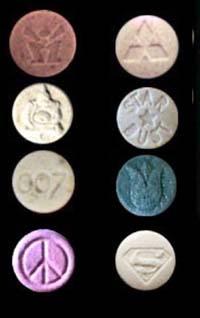Add music to ecstasy and multiply the result
2006/03/19 Galarraga Aiestaran, Ana - Elhuyar Zientzia

There are many myths about ecstasy. According to a widespread belief, ecstasy users do not take other drugs, and for example drink water and not alcohol. However, this is not true: studies of consumption habits have made it clear that people who take ecstasy usually do so along with other drugs, such as alcohol.
Another myth states that in the long run it does not cause damage and that most deaths from ecstasy consumption have been due to dehydration, not the influence of ecstasy itself.
Ecstasy (or 3.4 methylenodioxymethamphetamines or MDMA) accelerates the heartbeat and helps expel sweat. In addition, it is heated in the usual reception places, that is, in the discos. In addition, consumers dance and drink alcohol – alcohol is diuretic. With all the factors in mind, it is no wonder that consumers risk dehydration and, in the most serious cases, death. However, the combination of so many factors makes it difficult to know what the causal effect is.
Influence of music

Ecstasy pills contain, in addition to MDMA, other substances. (Photo: DEA)
Another component of the usual environment in which Ecstasy is consumed is music, and not of any kind. In fact, the consumption of ecstasy is intimately linked to the strongest and most repetitive music, and it was suspected that this can also influence. Thanks to their research at the Institute of Neurological Sciences in Italy, at least in part they have managed to resolve suspicions.
In this research they have worked with rats. Rats were given small doses of MDMA and large ones. Then the music was placed in the maximum volume allowed in the discos. The next step was to measure brain activity through the electrodes installed in the skull.
The music had a great influence. At first, without music, the smaller dose hardly affected brain activity. As for the music, the impact soared, as if it had given the greatest dose to the mouse.
Music also influences the duration of the effect. If high doses of ecstasy and stronger music are combined, the effect was noticeable until the fifth day. Without music it only lasted a few hours.
From rat to person

It is difficult to investigate the effect of drugs, so experiments are done with rats. (Photo: RGD)
Also at the University of Cambridge they investigate the influence of music on the effect of drugs and, according to their researchers, Italian research is useful to understand why the WTO affects more people to others.
In addition, Italian researchers demonstrated that MDMA harms the terminations of ratified neurons. In his opinion, ecstasy can have a similar effect on people. Perhaps that is why many people who have a habit of taking ecstasy tend to depression, mood swings and other alterations.
However, it should be noted that ecstasy users do not consume pure MDMA, as the pills contain many other mixed substances. Some of them are also highly toxic and certainly affect both the strength and damage of the pills.
Published in 7K.




